On March 14, 2008, the University of London’s Institute of Philosophy hosted a symposium on philosophy and the aphorism at Goodenough College. Poets, professors, philosophers, psychologists and comedians (all of them aphorists) from Europe and the United States gathered to discuss the aphorism as a bright, incisive way of grappling with the big questions of life—and to celebrate the form as just the thing if you hate ideologies but love ideas. Hereby a brief overview of the event, with links to foratv, which has posted video excerpts of some of the talks.
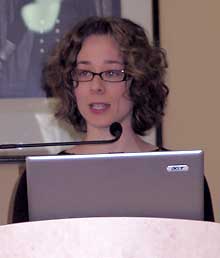
Tim Crane, director of the Institute of Philosophy, opened the day, which kicked off with a session entitled “What is an aphorism?” Stephen Clucas, reader in Early Modern Intellectual History, Birkbeck, University of London, examined attempts by some modern continental philosophers and theorists (including Maurice Blanchot, Jacques Derrida and Roland Barthes) to privilege the de-stabilizing, unsettling and open-ended fragment over the oracular completeness of the aphorism. In a witty and entertaining talk, Sara Levine, associate professor, MFA in Writing Program, The School of the Art Institute of Chicago, explored the pleasures and dangers of using the aphorism as a crash course in grammar and style for students aspiring to write “the great American novel.”
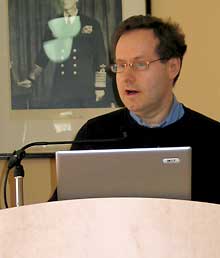
Simon May, college research fellow in Philosophy, Birkbeck, University of London and author of The Little Book of Big Thoughts, traced how aphorisms have been a principal weapon in the West’s peculiar urge to destroy all so-called ‘totalizing’ ideologies and systems of thought while making surreptitious claims to ‘totality’ themselves.
Roger Scruton, author, philosopher, and research professor for the Institute for the Psychological Sciences, distinguished between true, common-sensical aphorisms and what he called “the way of the wizard,” aphorisms that are false, eccentric and used more as spells than statements.

The next session was entitled: “Aphorisms: international perspectives.”Friedemann Spicker and Jurgen Wilbert, co-founders of the German Aphorism Convention and the German Aphorism Archive, described their aphorism activism—through lectures, workshops and performances—in Germany.
Philippe Moret, author of Tradition et modernité de l’aphorisme, spoke about the beguiling aphorisms of Paul Valery, including this one: “The skin is the deepest thing in man.”
Sami Feiring, chairman of the Aphorism Association of Finland, traced the history of and present trends in Finnish aphorisms. Boris Mitic introduced us to the Belgrade Aphoristic Circle through clips from his documentary film on these satirical aphorists, Aphocalypse Now.
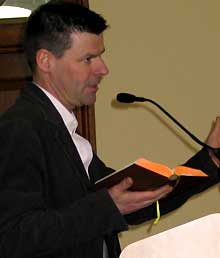
The next session was entitled: “Aphorisms: practitioners’ perspectives.” Don Paterson, Scottish poet and aphorist, started off by saying that “talking about aphorisms was like singing about painting,” but he nevertheless did manage to carry a lovely tune, outlining how “aphorisms generate aphorisms” through—appropriately enough—a series of aphorisms. James Richardson, American poet, aphorist, and professor of English and Creative Writing, Princeton University, talked about the aphoristic composition process and how it is different from writing poems. Fulvio Fiori, Italian author, playwright and aphorist, showed how he tries to “get aphorisms out of books” by performing some of his own sayings in the context of a talk about Zen and the art of the aphorism.
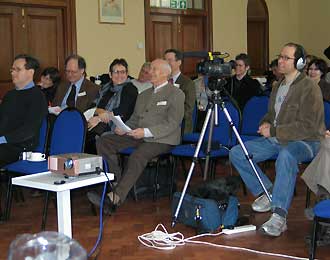
Bert Hellinger, German psychologist and aphorist, talked about—and demonstrated —how aphorisms can function as “words of healing.” The final session was called “Aphorisms: personal perspectives.” (Click here to see the full session on foratv.) I opened the session with a talk about how aphorisms are correctly described as pessimistic but how aphorists are, in fact, the ultimate optimists. (Click here for an excerpt from my talk on foratv.)
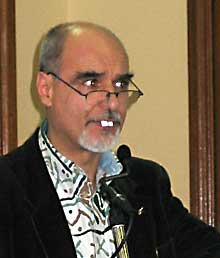
A.C. Grayling, author and professor of philosophy at Birkbeck College, University of London, spoke about the aphorism as an elite form of literature, a point of view over which he and I disagreed during the Q&A portion of the session. John Lloyd, producer of classic British comedies like Not the Nine O’clock News, Spitting Image, Blackadder, and QI, gave a hilarious dissertation on the subject of aphorisms and jokes, part of which you can see here on foratv. Tim Crane closed a day during which we all learned—and laughed—a lot.
All photographs by Sami Feiring.

